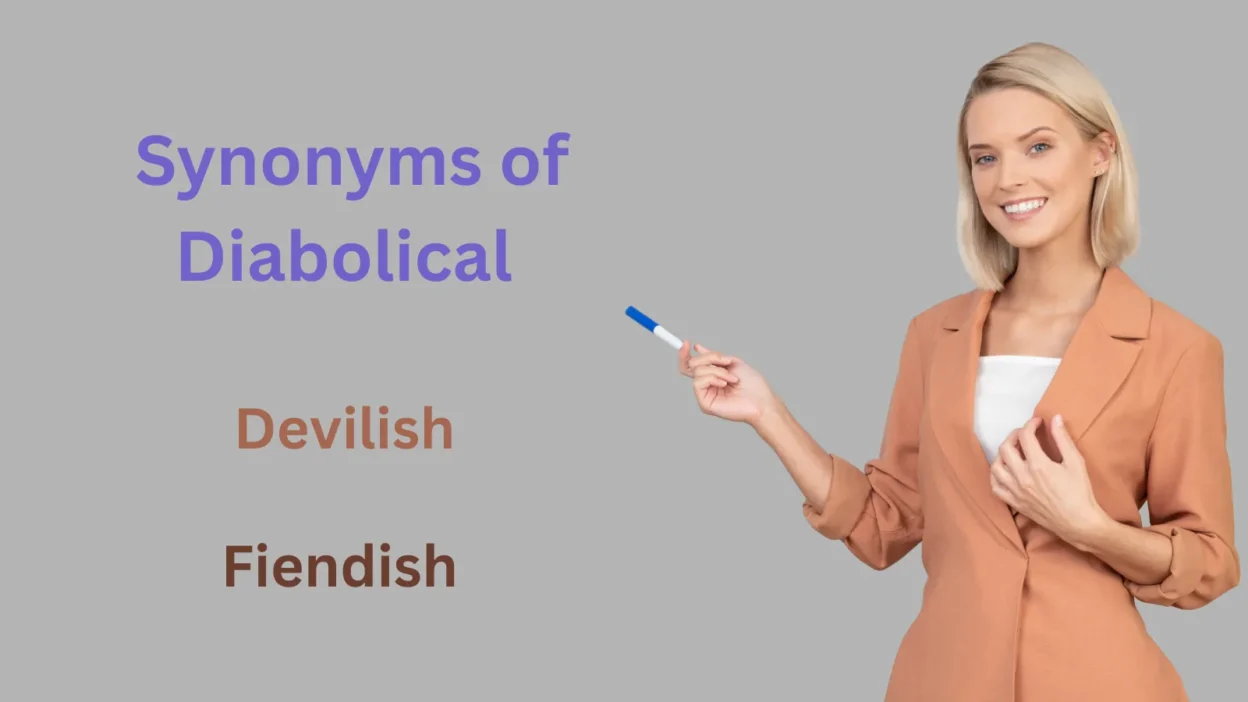Synonyms for diabolical, such as evil, fiendish, and wicked, reflect the dark, cruel, and shocking sides of extreme wrongdoing. For example, “fiendish” highlights clever cruelty, while “wicked” can range from playful mischief to genuine malice. These alternatives capture different degrees of evil—from subtle deceit to horrifying acts—and show how language brings darkness to life.
If you’re writing about villains, corruption, or moral extremes, using the right word for black hearted people helps you strike the perfect tone. In this guide, we’ll explore a range of words that express cruelty, clever wickedness, and pure malice—and when each fits best.
These other words for diabolical not only make your writing more vivid but also deepen your understanding of how language conveys evil and intensity. From literature to everyday speech, the vocabulary of “diabolical” reveals how powerfully words can portray darkness.
What Does Diabolical Mean?
Diabolical means evil, often cleverly or shockingly. The word derives from “diabolus,” a Latin term meaning “devil,” reflecting its dark origins. Over time, it has come to describe actions, plans, or people that show cruelty, deceit, or pure malice.
Depending on how it’s used, diabolical can suggest:
- Intelligent or cunning evil
- Deep cruelty or corruption
- Shocking wickedness or harm
- Dark humor or exaggeration in casual speech
It’s not just about being bad—it’s about being deliberately wicked. Diabolical captures the mix of intelligence, intent, and darkness that makes evil so striking in stories, history, and human behavior.
Synonyms of Diabolical (with Meanings, Usage, and Examples)
1. Devilish
Meaning: Cleverly wicked or mischievous.
When to use: When the tone is playful or cunning rather than purely evil.
Example: He gave a devilish grin before revealing his trick.
2. Fiendish
Meaning: Cruel, wicked, or intensely difficult.
When to use: For acts that show cruelty or challenge human endurance.
Example: The villain’s fiendish plan left no room for mercy.
3. Wicked
Meaning: Morally wrong or playfully bad.
When to use: Works for both serious evil and casual humor (“wicked sense of humor”).
Example: Her wicked laugh echoed through the empty hall.
4. Malevolent
Meaning: Showing a desire to cause harm.
When to use: When you want to highlight intentional evil or malicious intent.
Example: A malevolent spirit seemed to haunt the old mansion.
5. Sinister
Meaning: Subtly suggesting harm or evil.
When to use: For quiet, lurking threats or ominous moods.
Example: A sinister shadow crept across the wall.
6. Vile
Meaning: Extremely unpleasant or morally despicable.
When to use: To describe something repulsive or offensive.
Example: His vile comments disgusted everyone at the table.
7. Heinous
Meaning: Shockingly wicked or evil.
When to use: For acts of moral outrage, especially crimes.
Example: The court condemned his heinous deeds without hesitation.
8. Evil
Meaning: Profound immorality or wickedness.
When to use: When referring to true moral corruption or darkness.
Example: The film explores the nature of evil within human hearts.
9. Corrupt
Meaning: Morally tainted or dishonest.
When to use: Best for moral decay, politics, or power misuse.
Example: A corrupt official sold secrets to the highest bidder.
10. Malicious
Meaning: Intending to harm others emotionally or physically.
When to use: For personal cruelty or spiteful acts.
Example: Her malicious gossip destroyed his reputation.
11. Cruel
Meaning: Causing pain or suffering intentionally.
When to use: When focusing on lack of compassion.
Example: It was cruel to mock him after his loss.
12. Villainous
Meaning: Characteristic of a villain; wicked.
When to use: For fictional or exaggerated evil.
Example: He twirled his mustache in a villainous fashion.
13. Depraved
Meaning: Morally corrupt or perverted.
When to use: For deep moral decay or dark character flaws.
Example: The story revealed the murderer’s depraved heart.
14. Atrocious
Meaning: Extremely bad or horrifying.
When to use: For actions or conditions that are shockingly terrible.
Example: The prisoners were kept in atrocious conditions.
15. Nefarious
Meaning: Wicked or criminal, often secretive.
When to use: For schemes, plots, or hidden wrongdoing.
Example: Detectives uncovered a nefarious plan to steal identities.
16. Demonic
Meaning: Possessed by or resembling a demon.
When to use: For supernatural evil or intense fury.
Example: He attacked with demonic strength.
17. Infernal
Meaning: Relating to hell; extremely annoying.
When to use: For fiery, hellish imagery or strong irritation.
Example: That infernal noise kept me awake all night.
18. Horrendous
Meaning: Extremely unpleasant or horrifying.
When to use: For shocking events or conditions.
Example: The storm caused horrendous damage across the coast.
19. Abominable
Meaning: Deserving of disgust or hatred.
When to use: When something is morally revolting or utterly detestable.
Example: His abominable behavior ruined the ceremony.
20. Monstrous
Meaning: Shockingly cruel or huge and frightening.
When to use: For inhuman cruelty or grotesque imagery.
Example: The dictator’s monstrous cruelty knew no limits.
21. Macabre
Meaning: Gruesome or disturbing due to death or decay.
When to use: For horror stories, dark art, or deathly themes.
Example: The artist’s macabre paintings fascinated and repelled viewers.
22. Grim
Meaning: Harsh, severe, or lacking humor.
When to use: For serious, bleak, or cold-hearted tones.
Example: The soldiers faced the grim reality of war.
23. Ghastly
Meaning: Horrifying or shockingly bad.
When to use: For visually disturbing or terribly executed things.
Example: The ghastly sight made everyone shudder.
24. Baleful
Meaning: Threatening harm; menacing.
When to use: For subtle hostility or ominous warnings.
Example: She cast a baleful glance across the table.
25. Wretched
Meaning: Extremely miserable or contemptible.
When to use: For pitiable, morally weak, or despairing tones.
Example: He lived in a wretched state after the scandal.
26. Hellish
Meaning: Resembling hell; unbearable.
When to use: For intense suffering or chaotic situations.
Example: The heat in the desert was hellish.
27. Odious
Meaning: Arousing strong dislike or disgust.
When to use: For personal revulsion rather than moral evil.
Example: His odious remarks made everyone uncomfortable.
28. Twisted
Meaning: Mentally distorted or perverse.
When to use: For psychological evil or dark humor.
Example: The killer’s twisted sense of justice shocked investigators.
29. Barbaric
Meaning: Early, brutal, or lacking civilization.
When to use: For bad acts or uncivilized behavior.
Example: The punishment was barbaric by modern standards.
30. Ruthless
Meaning: Having no pity or compassion.
When to use: For cold ambition or merciless decisions.
Example: The ruthless general conquered every town in his path.
How to Choose the Right Synonym
Choosing the right synonym depends on tone, intensity, and intent:
| Tone | Best Synonyms | Example Use |
| Playful or mischievous | Devilish, Wicked, Fiendish | “He flashed a devilish grin.” |
| Pure evil or malevolence | Nefarious, Malevolent, Depraved | “A nefarious plot unfolded under the radar.” |
| Physical or visual horror | Macabre, Ghastly, Monstrous | “A ghastly figure emerged from the shadows.” |
| Moral outrage | Heinous, Abominable, Vile | “The heinous crime shocked the entire nation.” |
| Everyday frustration or exaggeration | Atrocious, Hellish, Infernal | “This traffic is absolutely hellish.” |
Tip:
- For fiction or storytelling, use emotionally charged words like sinister, demonic, or malevolent.
- For criticism or description, choose vile, atrocious, or odious.
- For drama or tone variety, balance intense terms (heinous) with lighter ones (wicked, devilish).
Cultural and Emotional Contexts
- Western literature often uses diabolical, demonic, and infernal to evoke religious evil.
- In modern English, diabolical can also be humorous: “That exam was diabolical!”
- In British usage, it may mean simply terrible or awful, while in American usage, it tends to retain its evil connotation.
Understanding these nuances keeps your language both accurate and context-appropriate.
Conclusion:
The synonyms for diabolical reveal just how many shades of evil, cunning, and malevolence language can express. From “wicked” and “sinister” to “fiendish” and “malevolent,” each term captures a different kind of darkness—whether it’s moral corruption, cruel delight, or pure chaos.
Choosing the right synonym depends on your intent: “malevolent” fits a story’s villain, while “devilish” can add a playful, mischievous tone. By understanding these nuances, your writing gains precision, power, and emotional depth.
In the end, exploring diabolical synonyms isn’t just about vocabulary—it’s about learning how language reflects humanity’s fascination with the dark side of imagination and morality.





